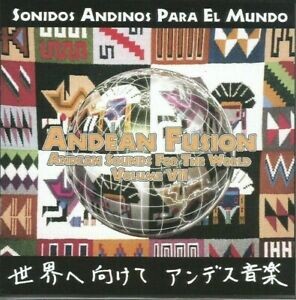 It doesn’t even take a full listen to realize that Andean Fusion is having a great deal of fun on Andean Sounds for the World Vol. VII. The South American themed band is famous for its daily performances at the trendy Rivercenter along San Antonio, Texas’s River Walk, offering a distinct change of pace and sound in a city overrun with tourist-centric mariachi bands. The original and traditional selections from the Andean mountain countries of South America — Ecuador, Peru, Bolivia, Chile and Argentina — are often haunting, invariably beautiful and filled with echoes of distant lands and culture. But on this disc, the band gives in to the realities of a tourism-driven economy and collects many of their most-requested popular music interpretations. Rather than a dilution of their skill and a case of selling out, the songs showcase the creativity and flexibility of Andean Fusion, with clever arrangements and performances that never betray the band’s roots.
It doesn’t even take a full listen to realize that Andean Fusion is having a great deal of fun on Andean Sounds for the World Vol. VII. The South American themed band is famous for its daily performances at the trendy Rivercenter along San Antonio, Texas’s River Walk, offering a distinct change of pace and sound in a city overrun with tourist-centric mariachi bands. The original and traditional selections from the Andean mountain countries of South America — Ecuador, Peru, Bolivia, Chile and Argentina — are often haunting, invariably beautiful and filled with echoes of distant lands and culture. But on this disc, the band gives in to the realities of a tourism-driven economy and collects many of their most-requested popular music interpretations. Rather than a dilution of their skill and a case of selling out, the songs showcase the creativity and flexibility of Andean Fusion, with clever arrangements and performances that never betray the band’s roots.
A case in point is the opening track, “My Heart Will Go On (Love Theme from Titanic).” Originally performed by Canadian superstar Celine Dion, the song was a huge hit. So huge in fact that the non-stop airplay prompted a negative reaction from me. In short, I developed a passionate loathing for it. Andean Fusion’s version changes all that. Stripping away the wailing vocals and slick production, they get to the song’s melodic core and the result is magical. With haunting sikus (South American pan pipes) and kena flutes setting the tone, guitars, bandolins and other instruments lay down subtle backing tracks that show why the original song was so popular to begin with — the music really is beautiful.
Two compositions by Carlos Santana follow, “Samba Pa Ti (Samba for You)” and “Flor de Luna (Moon Flower),” which are stylish, smooth and atmospheric. Excellent choices to come after the well-known opening track; listeners other than devoted Santana fans probably won’t recognize them, instead taking the songs for traditional works. The arrangements are comprehensive and complete, and it doesn’t hurt matters any that Santana relies heavily on Latin influences in his music.
Two other movie selections midway through the disc pack a powerful one-two punch. “A Fistful of Dollars” and “For a Few Dollars More,” both from Sergio Leone spaghetti westerns starring Clint Eastwood, showcase a rich, emotional resonance that echoes the desolate, arid settings of the original films. The success of the interpretations caught me wholly off guard, but in retrospect, it shouldn’t have: Ennio Morricone’s original scores incorporated ocarinas to enhance the Old Mexico flavor of the music, so Andean Fusion’s interpretations only take the pieces farther in a direction they were already heading.
Less successful are versions of the Lennon-McCartney songs “Hey Jude” and “Michelle.” Nothing is wrong with the songs, per se, but the arrangements lack any edge or bite — not that the original Beatles versions had all that much to begin with. Stripped of lyrics, the songs come off as somewhat flaccid and saccharine, a kind of Latino Muzak. I expected more of the same from the Frank Sinatra standard “My Way,” which has become so cliche it is almost laughable, but, as with “My Heart Will Go On,” the song took on new dimensions with Andean Fusion’s inventive arrangement. Opening with a minimalist guitar and sikus approach, the piece is nearly unrecognizable as a gentle, lazy melodic drift. Then the tone abruptly shifts, with kena flutes and more strings racheting up the energy level a dozen notches. It’s not quite samba, but it’s probably as close as a Frank Sinatra song will ever come.
And, believe it or not, the Sinatra piece is the perfect lead-in for the best song on the disc, the literal show-stopper. Terry Gilliam’s landmark film Brazil is widely considered one of the best motion pictures produced in the 1980s, but Gilliam’s exuberantly chaotic and joyful theme music is more often overlooked. Listening to the infectious energy poured into it by Andean Fusion, it’s hard to understand why. Sure, it’s a bright ray of light amidst a relentlessly dark (if funny) vision of future dystopia, but that only serves to underscore the dichotomies of Gilliam’s masterpiece. Stripped of the context of the movie, however, the music shines on its own and spills out of the speakers with unparalleled vigor. I like this tune. No, I love this tune, and it’s an appropriate finale for an album that’s gotten a lot of playing time in my stereo. This isn’t what you could consider traditional South American music at all, but it sounds good and is very entertaining. Ultimately, isn’t that all you can ask?
(INKA Records, 2002)
